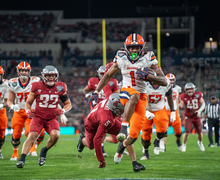Black Panther Party member, black feminists to speak at ArtRage Gallery
Courtesy of ArtRage Gallery
ArtRage Gallery on Hawley Avenue will host “From Panther 21 to 21st Century Revolutions” this weekend. The event will feature guest speakers who will discuss the evolution of the Black Panther Party.
With the rise of political activist groups like Black Lives Matter, ArtRage Gallery is looking to foster dialogues surrounding how the Black Panther Party’s influence is still felt more than 50 years after its creation.
The Black Panther Party, established in the United States in the 1960s, was created largely in part to challenge systemic police brutality within black neighborhoods and communities.
ArtRage Gallery will host “From Panther 21 to 21st Century Revolutions,” featuring guest speakers, on Saturday from 6 p.m. to 9 p.m. at its studio location on Hawley Avenue.
The guest panel will consist of three speakers from New York City: Sekou Odinga, déqui kioni-sadiki and Matt Meyer. The three will discuss the trajectory of the Black Panther Party to present-day social and political activism, according to ArtRage Gallery’s website. Their book, “Look for Me in the Whirlwind: From the Panther 21 to 21st-Century Revolutions,” will be available for purchase and signing at the event.
The gallery emphasizes art through the lens of social and political justice, focusing on inclusion and the breaking down of barriers.
“That’s been the mission from the beginning,” said Kimberley McCoy, community engagement organizer at ArtRage. “It’s important to help foster those conversations and create safe spaces for people to come and learn from each other.”
Odinga is an original member of the Black Panther Party’s Harlem Chapter who has continually advocated on behalf of political prisoners of war. kioni-sadiki, a black feminist, educator and chair of the Malcolm X Commemoration Committee, is a human rights activist who works to raise public awareness of political imprisonment in the U.S.
“Most people in this country don’t know that political prisoners exist,” kioni-sadiki said. “More than anything, we’re taught the mythology of U.S. history and the distortions.”
The third speaker, Meyer, is a senior research scholar at the University of Massachusetts Amherst’s resistance studies initiative with a mission to bridge activism and academics. A published author, his work includes the two-volume Pan African peacebuilding series, featuring 2008’s “Seeds of Hope.” In recent years, his work has focused on racism and militarization in the U.S.
Another event with Odinga, dequi and Meyers will take place at SUNY Oswego on Thursday from 3 p.m. to 5 p.m. in the Marano Campus Center. The open forum discussion will present the same theme as ArtRage, and include topics such as the connections and disconnections between historical and present-day social movements and the roles minority women and the LGBTQ community play, according to SUNY Oswego’s website.
“The biggest thing that I hope guests will take away from this event are ways that we can support each other in fighting for equality and fighting for justice and fighting for humanity together,” said Latoya Lee, assistant professor at SUNY Oswego and a main organizer of the two events.
kioni-sadiki said when people study the Black Panther Party’s Ten-Point Program, they will see that the group dealt with issues of injustice that are present today — including conversations occurring in the Black Lives Matter and #MeToo movements.
The Ten-Point Program is a set of guidelines created by the Black Panther Party’s founding members, addressing issues such as freedom, equal employment and housing opportunities and the “immediate end to police brutality and murder of Black people,” among others.
These speaking events aim to build awareness for political prisoners, kioni-sadiki said, by educating the public on the history of movements, why they came about and how the government worked to defeat and crush those revolutionary movements of the 1960s and 70s.
“The Black Panther Party was able to galvanize young people and help them see not only that change only happens when you work for it, but that it was their responsibility to do it,” kioni-sadiki. “That is the aim now to inspire a nation of young people to get involved in changing their life conditions.”
Published on February 20, 2019 at 9:54 pm






